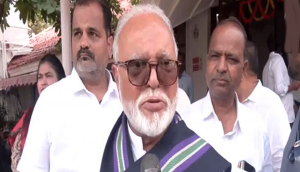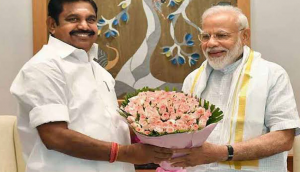Gujarat Assembly elections: Will it be as smooth sailing for BJP as UP was?

There are rumours that Gujarat might go to polls early. While the Bharatiya Janata Party (BJP) has ruled the state non-stop since 1995, the upcoming Assembly polls might be a tough battle for the party.
The party is riding high on its massive Uttar Pradesh victory, but that might not be enough for it to win it easy. And this is also because this is the first time after two decades that the state does not have Narendra Modi as chief minister.
Chief Minister Vijay Rupani has a lot to deal with before his government can hope for a landslide victory in Modi's home-state as well. These include:
– The nearly two-year-old Patidar movement for reservations under the OBC category
– The restlessness among the Dalits after the Una flogging last year
– The palpable farmer distress
– The ill-effects of demonetisation on the cooperative sector
– A spate of recent rape incidents in parts of Saurashtra and Kutch region
– Most importantly, the absence of Narendra Modi
However, the BJP think-tank is considering that an early election, while the party is still under the euphoria of the 325-seat landslide in UP, could well dwarf all the nagging issues the government in Gujarat is currently facing.
By December, the present excitement might dissipate exposing Rupani to the vagaries of anti-incumbency akin to what Akhilesh Yadav encountered in UP.
Riding the UP wave
Enthused with the country’s largest state in its pocket, the BJP that has all 26 out of 26 Lok Sabha seats in its kitty, now aims to eat up 150 out of 182 Assembly seats in Gujarat.
"UP mein 325, Gujarat mein 150" is the mission statement given out by PM Modi to the rank and file of the party back home.
Hoardings are already up in major cities in Gujarat with this slogan accompanied by pictures of the Modi-Amit Shah duo.
“There is a Modi wave across the country, and we are prepared if there is an early election. We will definitely win more than 150 seats,” Rupani told NDTV, something that he and state party leaders have often told the media before and after the Uttar Pradesh verdict.
But this is easier said than done.
Even with the Modi wave, the 150-seat target is insurmountable for the BJP given the fact that the Congress has always returned 50 to 60 MLAs irrespective of the strongest Hindutva wave since 1995 when the BJP first came to power. Including in post-Godhra 2002.
The BJP has 123 seats in the House of 182 with 57 belonging to the Congress and one each to the Nationalist Congress Party (NCP) and the Janata Dal (United).
The party strategists realise they need to drive a wedge among the unbeatable Congress bastions to reach close to the 150 target and Amit Shah, it is already learnt, has already initiated his characteristic manoeuvring to poach among the invincible Congress MLAs.
Simultaneously, the announcement by the NCP, which has absolutely no network in Gujarat, that it will contest as many as 80 seats is being speculated to be Amit Shah’s quiet understanding with NCP supremo Sharad Pawar to break into the Congress votes.
NCP leader Praful Patel even opened a party office in Ahmedabad last week.
Prepped early
Notwithstanding all these, the BJP has been in a campaign mode in Gujarat much before the recent elections to five states.
Modi has visited the state as many as seven times since September last year out of his ten sojourns to Gujarat ever since he left for Delhi in May 2014.
Besides addressing public meetings to enthuse the cadre, as well as the people in general, with his inimitable oratorial style, Modi's purpose was to curb political unrest within the party and ask factions to bury the hatchet and prepare for a challenging electoral contest.
Squabbling factions was a key reason as to why Modi’s protégé – Chief Minister Anandiben Patel – had to make way for Amit Shah’s candidate Vijay Rupani.
More recently, the party concluded a 12-day Adivasi Vikas Gaurav Yatra through the tribal belt stretching from Unai in South Gujarat to Ambaji in North Gujarat as early as 19 February. The yatra criss-crossed as many as 27 constituencies dominated by tribals through its 1,500-km route.
The idea behind targeting the tribals is to offset the losses expected from an apathetic Patidar (Patel) vote. Patels constitute a little over 12% of the state’s population as against the tribals, who are around 15%.
Though the BJP has found a toehold in the tribal belt over the last two elections, the region is considered to be a strong bastion of the Congress.
If there are around 24 seats where the Patels can influence the outcome, 27 seats are dominated by the tribals.
The noises in Gujarat, indeed, are of an early election.
The author is the chief editor of Gujarat-based news portal www.meranews.com
First published: 27 March 2017, 12:52 IST





![BJP's Kapil Mishra recreates Shankar Mahadevan’s ‘Breathless’ song to highlight Delhi pollution [WATCH] BJP's Kapil Mishra recreates Shankar Mahadevan’s ‘Breathless’ song to highlight Delhi pollution [WATCH]](https://images.catchnews.com/upload/2022/11/03/kapil-mishra_240884_300x172.png)

![Anupam Kher shares pictures of his toned body on 67th birthday [MUST SEE] Anupam Kher shares pictures of his toned body on 67th birthday [MUST SEE]](https://images.catchnews.com/upload/2022/03/07/Anupam_kher_231145_300x172.jpg)






